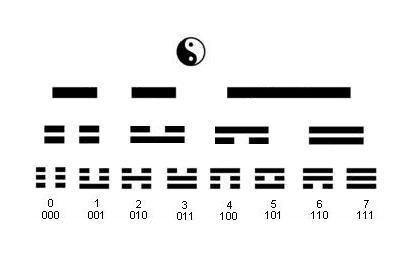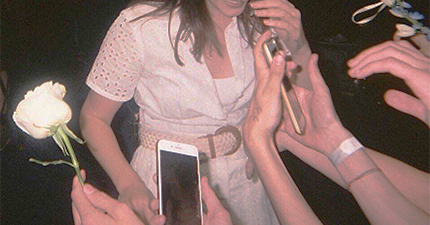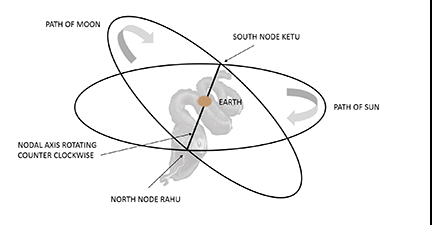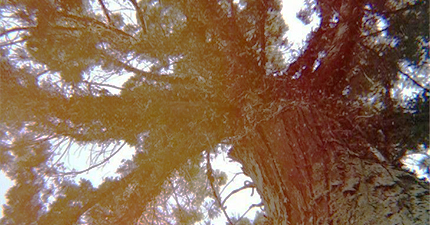There’s a saying—out of one, comes two. Out of two, comes three. Out of three, comes everything. 一生二,二生三,三生萬物. This phase actually comes from daoism.
In my previous article about Chinese divination basics, we mostly focused on one and two. We looked at the two principles—yin and yang. Yin and yang are represented by one line (either ⚋ or ⚊). Then, we looked at how the two principles become four images. The four images are four conditions of light: morning, day, evening, and night. The four images are represented by two lines: ⚌, ⚏, ⚍, and ⚎.
Now let’s move onto three. When you add another line, you create eight possible combinations of broken and unbroken lines. These are the eight trigrams or the bagua (八卦).

The eight trigrams are as follows:
☰ is 乾 whose nature is the cosmos (天)
☷ is 坤 whose nature is nature (地)
☳ is 震 whose nature is thunder (雷)
☴ is 巽 whose nature is wind (风)
☵ is 坎 whose nature is water (水)
☲ is 離 whose nature is fire (火)
☶ is 艮 whose nature is mountain (山)
☱ is 兌 whose nature is marsh (泽)
Before we look at different compositions for the trigrams and how that takes us to the wuxing or five phases, let’s just look at each trigram. What the trigrams describe are social roles. If you’re looking for gender in cosmology, then this is actually a place where you would find it.
Chinese genders are really invested in family systems. Being female or male is one thing, but being an older or younger sibling is a whole other thing. A younger sister and an older sister have different enough social roles that they are described using a completely different symbol and natural element in cosmology.
☰ and ☷ are basically just the parents. ☰ is father and ☷ is mother. ☰ is usually thought of as pursuing. It’s nature is represented by the dry sky or the cosmos. ☷, on the other hand, is wet and creative like the ground. It's thought of as withholding. How does creation happen? The sky lies on top of the ground. The father lies on top of the mother.
☳ and ☴ are kind of opposites too. You can see how they compliment each other in the lines. ☳ is thunder and ☴ is wind. These are actually two components of a storm. ☳ and ☴ are the eldest children—thunder is eldest son and wind is eldest daughter. Together, they’re actually talking about the cardinal directions.
☳ is an image is yang emerging in an environment that is pretty much just yin. It’s like the hour of midnight when everything is at its darkest. The only thing that can happen in that environment is for light to grow. Thunder shows light coming in like an explosion. That’s supposed to be the energy of the eldest son in a family system.
☴ shows the opposite image. It’s yin emerging from a context that is almost entirely yang. Things are so hot that you just crave a little drink of water to cool down. That’s the feeling of wind or breeze. While thunder is thought of as shocking, wind is thought of as obedient. The name of the trigram, 巽, also means to obey. That’s supposed to be the eldest daughter in a family system. Wind influences matters through influencing other people and either obeys other people or makes other people obey her. Wind is about negotiation.
☵ and ☲ are, again, oppositional. ☵ is water and ☲ is fire. On the outside, water is yin or murky and hidden. If you are trapped in an abyss of water from all sides then you’re not going to be able to see that much around you. However, the heart of water is yang. You can use water to rinse something off. Cleaning something with water makes it more visible. Fire has a yang exterior. It illuminates its environment and helps you see around you. Its heart, however, is yin. If you burn something, you also darken it.
Water describes the middle son and fire describes the middle daughter. Fire is something that actually can’t exist on its own. It needs something to burn. That’s why fire is thought of as clinging. Middle daughters are supposed to cling to families. But fire is always trying to rise up. The middle daughter is married off and leaves the home. That story is contained within the meaning of fire as representative of the middle daughter. Fire is joy that you want to hold onto but which will eventually leave you.
Water, on the other hand, doesn’t rise up but only sinks. Honestly, the trigram for water is seen as really negative. 坎 is actually a deep pit or an abyss. God, how depressing! But the meaning is that the middle son stays with the family. All of the daughter related trigrams show more movement than the son related trigrams because daughters are married away while sons stay with the family. 坎 also contains a 土 which is actually earth or mother. It stays near the mom.
Because water is a pit, it’s also associated with danger or crisis. This probably has to do with succession. As we’ve seen from the TV show Succession, the middle son Kendall is the one with the killer instinct. Maybe the second son being associated with danger is also a warning. In imperial political stories, isn't it the second son who gets pruned? Sent off the war or straight up killed because he's a rival to the first born son?
The last two trigrams are ☶ and ☱. ☶ is mountain and ☱ is marsh. These are basically the trigrams for the eldest siblings turned upside down. That means that they have the opposite meaning. If ☳ or thunder is light shocking a mostly dark environment, then ☱ is the morning. If ☴ is coolness about to come during the hot summer heat, then ☶ is the fall or the base of a mountain where coolness has already gathered.
☶ is yin on top of yin—earth piled on top of earth. It’s literally a mountain. You can even see this in the trigram itself if you imagine that the broken lines are solid and the unbroken one is open sky. Mountain is youngest son energy. Youngest son also stays put and is kept even closer to the mother. Basically, the mountain doesn’t have to try to be anyone who it doesn’t want to be. Mountains aren’t like fire or water which have to spill or reach out. It just is. It stays within the confines of its own identity and is protected. Mountain or youngest son is about just being yourself. Youngest sons also have to put up a ton of boundaries because they feel weighed by the older siblings. The mountain is the maknae of the group.
☱, on the other hand, is open land. It’s a marsh or pond. Marsh does have more movement as all of the daughter trigrams do but it also draws things into itself. Marsh is really flirty. Youngest sister is supposed to be really fertile. It’s also really messy. 兌 is sometimes translated as discourse or exchange but I like to think of it as flirtation or beckoning. This is land that is open, which is represented by the broken line above on the outside, and this land invites people in. While the youngest son is protected and sheltered, the youngest daughter is open and carefree. His fate is certain while hers is uncertain.
So there you have it. One becomes two and two becomes three. Three has a lot to do with these Confucian gender roles. This stuff is actually pretty useful if you use family systems to think about the psyche even if you don’t stay within the strict bounds of gender and age hierarchy. You might identify with more than one of these roles or move between them based on friend group. Maybe you're the dad friend with some people but a younger sister at heart. Next time, we’ll take a look at how the trigrams are composed, what contexts they can be read under, and how three becomes everything.
1 of 19
>>>


